Seagate's Momentus XT Reviewed, Finally a Good Hybrid HDD
by Anand Lal Shimpi on May 24, 2010 9:31 AM EST- Posted in
- Storage
- SSDs
- Seagate
- Momentus XT
- Hybrid Drive
- SSHDs
SYSMark 2007
Traditionally we use SYSMark in our CPU reviews but I've been slowly accumulating data for use in Bench and decided to debut some of it here today. SYSMark can be very CPU bound and thus we don't see huge differences between storage devices, but any difference here is significant. SYSMark tends to measure response time more than throughput, making it a relatively good indicator of the feel of a drive like the Momentus XT.
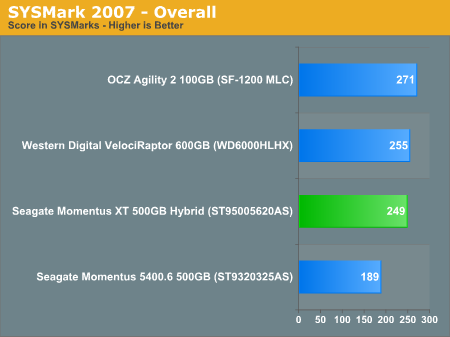
Overall performance is much better than the 5400.6 and nipping at the heels of the VelociRaptor. In the tests below you'll see the Momentus XT trade blows with the VelociRaptor. In some cases it's faster, and in others it's a bit slower.
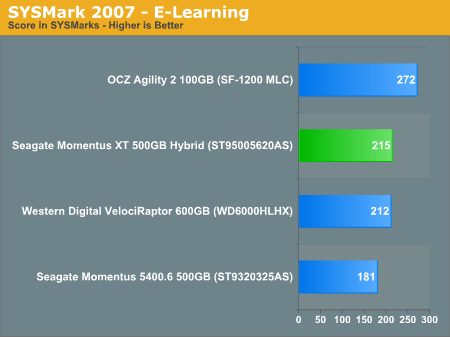
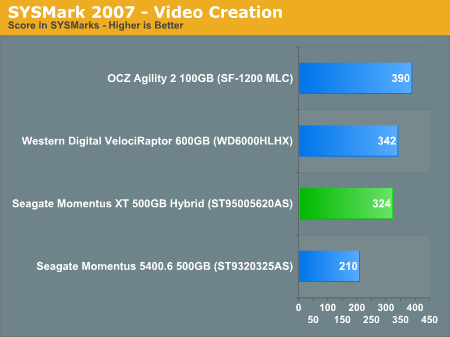
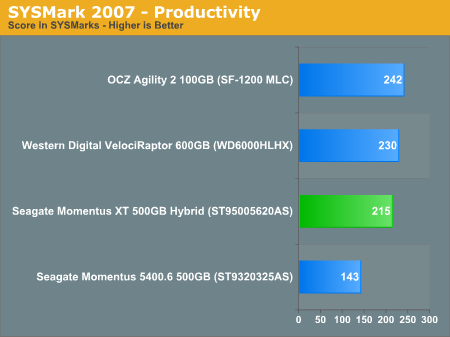
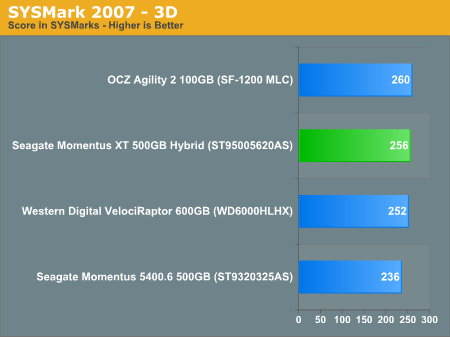










120 Comments
View All Comments
Faruk88 - Monday, May 24, 2010 - link
Hey Anand,As always I love your reviews - great job!
I have a quick question: Does this drive constantly spin up and spin down to save power? The reason I ask is because this puts a lot of wear on the mechanical drive.. so I would stay away from this drive if that is the case.
I still wonder why no drive manufacturer has tried to pair 60-80GB of flash with a mechanical drive and combine it into one 2.5" package. Instead of having a hybrid drive like this, I would rather have one Flash partition for my OS and apps, and one partition on the mechanical drive for the rest of my data. This would be useful for laptops, which usually only have one drive bay. Obviously the two "drives" would have to share the SATA bus, but I think the advantages would outweigh the disadvantages.
Faruk
kmmatney - Monday, May 24, 2010 - link
I would also like a system like that. You can also backup for flash partition to the mechanical partition.void2 - Monday, May 24, 2010 - link
Core i3-350M, 5400 RPM 2.5" HDD, clean Windows 7 - and I get ~30 seconds from power button to web browser (~22 seconds if I would install "Boot Cooler", but that's not the point). You, on the other hand, get ~50 seconds on "partial" boot sequence (no POST, no web browser) and much more powerful CPU. It definitely looks like Windows 7 ReadyBoot (successor to "regular" WinXP boot prefetch) did not have enough time to learn. So this does not look like real-life comparison.Drag0nFire - Monday, May 24, 2010 - link
With any notebook HDD, one of the most important considerations for me is how noisy it is. I really value a quiet notebook.Although I know this won't be as quiet as an SSD, could you describe the noise characteristics? Can you hear it at idle? Seeking?
Thanks Anand!
wyemarn - Monday, May 24, 2010 - link
Tom's came up with an article comparing XT with a plain Momentus 7200.4http://www.tomshardware.com/reviews/seagate-moment...
nickkb - Monday, May 24, 2010 - link
The Tom's Hardware review was almost a polar-opposite of Anand's. They performed a number of tests but did not include what I think is absolutely crucial to the intended purpose of this drive: the Boot Time vs. # of runs. I don't know what they intended to extract from all of their tests, as the base storage media of this drive is mechanical, not flash. Therefore, it comes as no surprise that the XT performed almost on-par with the vanilla version of the Momentus 7200.4 in many of their tests.leexgx - Monday, May 24, 2010 - link
most of tomshardware is just junk most of the time and i recommend no one going onto there site as you just end up asking more questionsfboone1 - Monday, May 24, 2010 - link
I'm definitely intrigued by this drive. If I were to put 2 of them in a RAID 0 array, what would happen? Would I have effectively 8GB of NAND cache? Would doing so greatly increase performance?BJ Eagle - Wednesday, May 26, 2010 - link
I for one would certainly alspo like to see RAID 0 and 1 results. I would suspect that this Momentus XT drive would benefit similiar to RAID as traditional harddrives, but it would be nice to have it confirmed.CharonPDX - Monday, May 24, 2010 - link
Since when is a third of a Watt at idle, three-quarters of a Watt at load, "consider[ably] more power"?
With most notebooks nowadays having a 40 Watt-hour batteries or higher, an increase of one Watt won't exactly kill battery life. And that's assuming it's going constantly at full power.